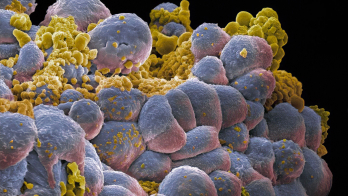
Image credit: European XFEL GmbH.
On 3 September, the tunnel-boring machine TULA – for TUnnel for Laser – broke through the wall of its reception shaft to complete the first 480 m of the tunnel system for the European XFEL project, which will extend for 3.4 km from Schenefeld in northern Germany to the site of the DESY laboratory in Hamburg. The machine will excavate two of the photon tunnels plus the main tunnel (p32) for the superconducting linear accelerator that will drive the free-electron laser. It will be joined in late 2010 by a second, smaller machine that will excavate the other sections of the photon-tunnel system.
When TULA set out on its “maiden journey” at the beginning of July, it was not at all sure that it would reach its goal on schedule eight weeks later. How long the machine would take depended on the composition of the soil and on the presence of unknown potential obstacles underground. However, all apparently worked out perfectly and TULA has completed the first section of photon tunnel. The machine will now be dismantled and the various parts transported back to Schenefeld and reassembled again for its second assignment on a 594 m-long photon-tunnel section to begin in early November.
Another important milestone was reached on 7 September, this time towards the construction of the superconducting linac. Two workshops took place to co-ordinate the future collaboration of DESY with two firms elected for the industrial production of the superconducting accelerator structures. These structures are a joint contribution of DESY and INFN Milano, co-ordinated by DESY.
At the workshops, representatives of the firms and of DESY met to discuss their collaboration. DESY has commissioned each of the two firms – Research Instruments (Bergisch-Gladbach, Germany) and Zanon (Schio, Italy) – to produce 300 superconducting cavities, for a total of about €50 m. Each company will first deliver eight pre-production units to test the infrastructure newly installed at the firms. Another 280 cavities will follow together with 12 accelerator structures manufactured within the framework of the EU ILC HiGrade project. DESY is not only acting as a commissioner for the cavities but is also providing the superconducting niobium, its own machines and know-how for quality control.
The delivery of the pre-production cavities is to begin in the coming year, while that of the series production will start at the beginning of 2012 and should be finished within two years. After successful testing at DESY, the cavities will be transferred to Saclay, for the assembly of the XFEL accelerator modules.







